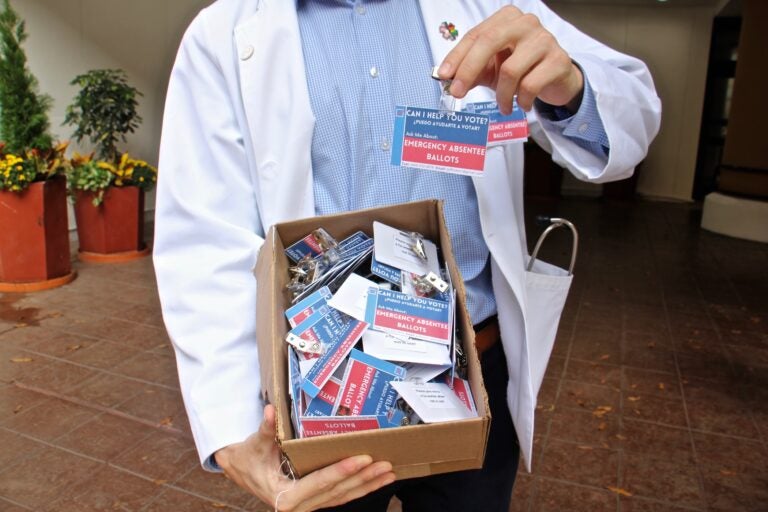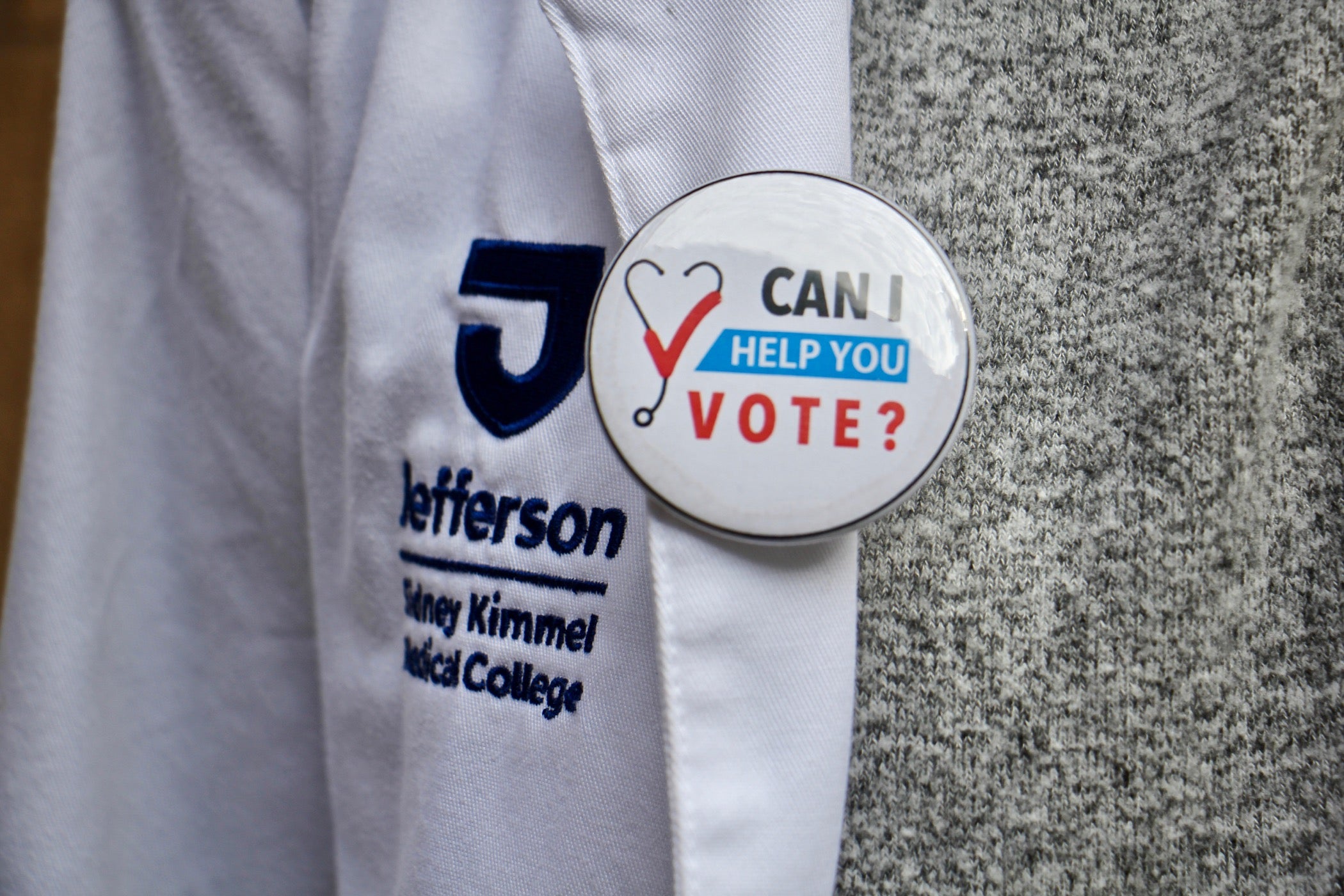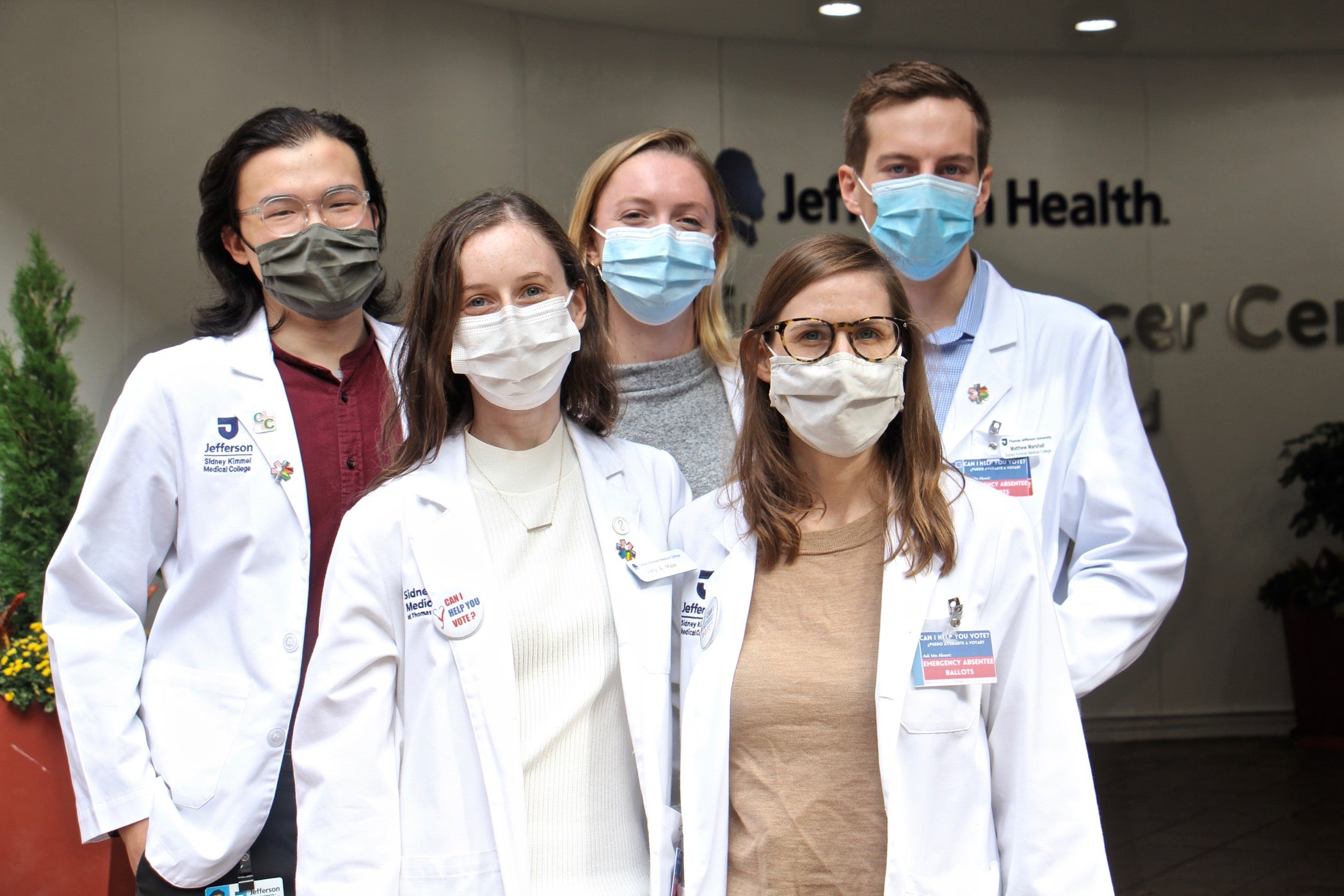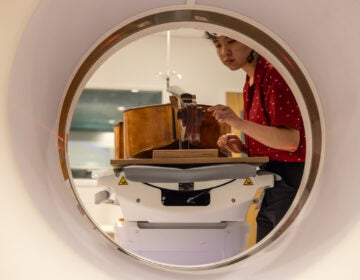Voting from bed: Philly hospitals work to make sure every vote counts
In Pennsylvania, anyone who becomes physically ill or disabled after the deadline to apply for an absentee ballot is eligible for an emergency absentee ballot.

Jefferson University medical students are making sure that patients have an opportunity to vote. (Emma Lee/WHYY)
The deadline to request an absentee ballot in Pennsylvania was last week, meaning those who haven’t requested one should plan to vote in person on Tuesday.
Unless of course, amid the latest spike of surging coronavirus cases, you find yourself sick, exposed or hospitalized.
Anyone in this situation need not fear: you can still vote, and help is on the way.
In Pennsylvania, anyone who becomes physically ill or disabled after the deadline to apply for an absentee ballot is eligible for an emergency absentee ballot. Those ballots must be requested from the person’s county election office and returned by 8 p.m. on Election Day.
To make this happen, crews of volunteers at Philadelphia regional hospitals have been running a full ground game since last Tuesday.
“It’s something that nobody thinks about — what happens to inpatients on election day?” said Katheryn Linder, a fourth-year medical student at Jefferson University’s Sidney Kimmel Medical College.
“There must be something for them.”
In 2019, after no one at the hospital could answer her questions about how inpatients could vote, Linder reached out to the Pennsylvania Board of Elections and learned there is a process in place for patients to vote via emergency absentee ballot.

The logistics though, were pretty complicated. So Linder assembled a team of hard-working, democracy-loving medical students to get the job done.
To let people know that they can still vote, the group prints fliers and slips them on to patient meal trays. If people would like to request an emergency absentee ballot, they are instructed to tell their nurse or doctor, or text “VOTE” to a central Google Voice number, where one of their volunteers will respond.
Julia Dewey, another organizer of the Jefferson effort, remembers last year, a patient texting “VOTE” three times in rapid succession when no one responded immediately. The volunteers hurried to get someone to her room, where they learned she had voted in every election since she became old enough.
“She was getting ready to miss the first election of her life because she was so sick and we were able to ease her mind on that,” Dewey recalled. “She was able to focus on healing.”
Alongside the ballot request, the patient signs a form appointing the hospital volunteer as their designated agent. The volunteer will then run the application to the patient’s county election office to request their ballot before a judge.
Until this year, each agent could only request a ballot for one voter at a time. Now, the election code is updated so that one agent can request emergency ballots for multiple voters at once, making the process more efficient.
Once the judge approves the request, the agent returns the ballot to the patient, where he or she fills it out and returns it to the agent, who then delivers it sealed and completed back to the county seat.
In 2019, Jefferson volunteers submitted 85 emergency absentee ballots on behalf of patients, and the year before they submitted 92. Penn Medicine has a similar program, which has submitted 200 ballots since it began in 2016. Einstein and Temple are also poised to run ballots for patients, each with dozens of volunteer medical students, residents and other staff who took the day off to help shuttle ballot requests.

As of Monday morning, Jefferson’s team had delivered 28 ballots and had 35 more at various stages of processing. If past years are any indication, volunteers expect to be delivering ballots from the hospital to county seats up until the last minute on Tuesday.
Linder remembers one patient last year who requested a ballot, but who she couldn’t find when it came time to have her fill it out. When she finally tracked her down, she was still recovering from a surgery. Her nurse anesthetist said the first thing the patient had said when she came to, was “where’s my ballot?”
While the emergency absentee efforts are not partisan, Einstein’s vice president for government relations, Bill Ryan, said the health system views civic engagement as a component in the overall health and well-being of the patients they serve.
“The services and support that a lot of people need to have healthy communities are a lot of times determined by who’s in office,” said Ryan. He noted that this election can serve as a referendum on the Affordable Care Act, which expanded Medicaid for many of the patients Einstein sees.
“Access to Medicaid coverage is on the ballot,” he said. “We’ve been moving in a direction where health care is being delivered in a more wraparound way, but that’s only possible if we can fund it and support it.”
The number of voters eligible for emergency absentee ballots could be much larger this year due to COVID-19. Those quarantining at home due to potential exposure or in isolation after testing positive are both eligible for emergency absentee ballots, if they haven’t already voted.
People who may have been exposed to COVID-19 or who have tested positive should not pick up or drop off their ballots in person.
If those staying home are patients with any of the Philly area hospitals, they can contact someone from their care team to arrange a volunteer to help them request and return their emergency ballot. If not, that person can contact their county election office and designate an agent to pick up their emergency ballot and drop it off in person by 8 p.m. on Election Day.
“If you can’t find a designee, the law actually requires the county election office to have a Sheriff’s Deputy or some county official to deliver the balloting materials for the voter,” said Pa. Health Secretary Rachel Levine in a statement, making it clear that neither logistics nor poor health should get in the way of anyone’s right to vote.

Get daily updates from WHYY News!
WHYY is your source for fact-based, in-depth journalism and information. As a nonprofit organization, we rely on financial support from readers like you. Please give today.






